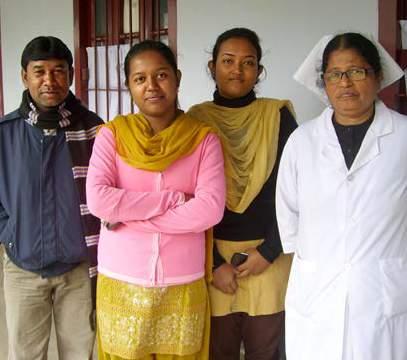
2 minute read
Hospital Corners
by USPG
ISSUE 1 2020
A conversation with USPG regional manager Davidson Solanki
Deepa Roy, a student nurse Credit: USPG/Leah Gordon
Bollobhur hospital in Bangladesh’s Meherpur District is just three miles away from the border with India. This 65-bed village hospital is a key part of the Church of Bangladesh’s mission, catering for the health needs of people living in the heavily populated villages nearby. It is one of two hospitals through which the Church of Pakistan is helping people acquire job skills.
The hospital offers training courses in nursing and midwifery for women, and laboratory technician training courses for men. Students come from the various tribes that live in the Chittagong Hills and villages on the border between Bangladesh and India: tribes such as the Santali, Garo and Chakma people. In rural areas of Bangladesh, an estimated 35 percent of the population lives below the poverty line. Many of the trainee nurses and lab technicians at Bollobhpur Hospital are from these marginalised communities.
The three-year nursing course covers everything from basic first aid to family healthcare and midwifery. It follows a curriculum set by the government of Bangladesh. On completion, successful students receive a license that is recognised nationally. The course for lab technicians is eighteen months long. Nurses and laboratory technicians who trained at Bollobhpur work all over Bangladesh - in government service, private clinics and hospitals, industrial and home nursing and in community health programmes.
USPG is a long-term partner of Bollobhpur Hospital and funds the nurses’ training, as well as the hospital’s running costs. ‘This part of Bangladesh is very remote and lacks in basic facilities,’ Davidson says. ‘The hospital is a great help. The women training here are being empowered with knowledge. It’s also providing them dignity and confidence - as well as with skills they can use to earn an income. One can see the Church of Bangladesh really meeting the needs of its people.’
Established in 1926, the Christian Mission Hospital in Rajshahi - one of Bangladesh’s major metropolitan hubs - sits right in the midst of the hustle and bustle of ‘the silk city of Bangladesh’, where an estimated 21 percent of the urban population live below the poverty line. USPG supports the Christian Mission Hospital as it plays a huge role in the church’s mission - not just in providing healthcare, but also in empowering people economically.
The hospital has a Nursing Institute providing quality senior nursing training for both meen and women, with a nationally recognised, three-year Diploma course in Nursing Science and Midwifery. Students at the Rajshahi city hospital have access to more facilities than they would have in a rural hospital like the one in Bollopbhur. Nevertheless, the teaching in both hospitals is of the same high standard.
‘Programmes like the nursing training at Bollobhpur and Rajshahi bestow women with confidence, dignity, self-worth and self-esteem,’ Davidson says. ‘Their impact is huge. The women on these courses mostly come from very difficult economic and social backgrounds. It’s good that USPG is accompanying the Church of Bangladesh in supporting nurses’ training here.’











